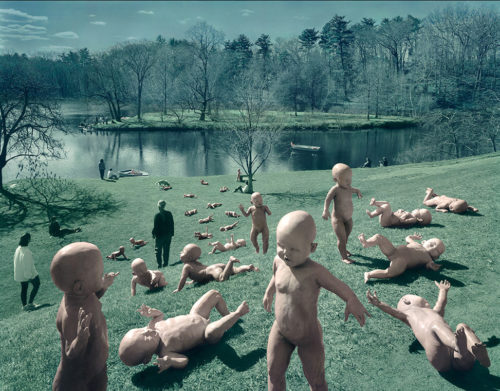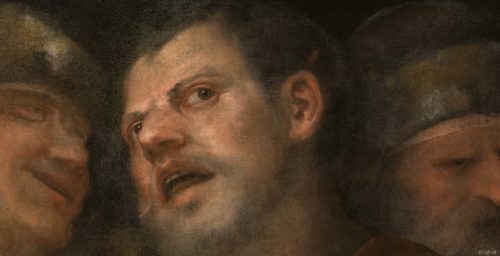
Tadasky (Tadasuke Kuwayama)
“…if shame shows itself at all, then it does so precisely through self-concealment.”
Gunther Anders (Promethean Shame)
“Few understand the extent to which Silicon Valley is the alter-ego of Pentagon-land, even fewer realise the impact this has had on the social sphere.”
The Cogent (How the West Was Won: Counterinsurgency, PSYOPS and the Military Origins of the Internet march 4th 2022)
“The scientific verification of experience which is enacted in the experiment- permitting sensory impressions to be deduced with the exactitude of quantitative determinations and, therefore, the prediction of future impressions – responds to this loss of certainty by displacing experience as far as possible outside the individual: on to instruments and numbers.”
Giorgio Agamben (Infancy and History)
“These new forms of knowledge platforms are built to structure our reading in particular ways, opening the possibility of distracted and fragmentary reading habits in contrast to deep reading, which may make it difficult to develop critical reflection or offer space for contemplation.”
David Berry (Critical Theory and the Digital)
“The ability to think without claiming, or even seeking, to fully understand is key to survival in a new dark age…”
James Bridle (New Dark Age)
Gunther Anders (and more on him below) felt humans had reached a place where they preferred what was made to the one who made it. The creation over the creator. And that they felt this, or feel this, rather, in relation to themselves. Their sense of inferiority to the machine. Now this feels like the description one might give to Elon Musk or most of the transhumanist thinkers out there today (and a bit more on that below, too).
One of the keywords you will find in most essays about transhumanism, or by transhumanists, is ‘could’, These new technologies (nanotechnology, biotechnology, information technology and cognitive science, the so called NBIC technologies) don’t yet do anything that their adherents promise. But they ‘could’, one day, and often this is later rephrased as ‘will’. This also bleeds into ‘brain interface technologies’, and AI in general. Here is a sentence from a 2017 article ( by Alexander Thomas, “Super Intelligence and Eternal Life):
“Nanobots could roam our bloodstream to monitor our health and enhance our emotional propensities for joy, love or other emotions.”
What does enhance even mean here? This is that weird sense of automatic hierarchical thinking that infects all of this stuff. I feel ‘enhanced’ love for you, darling. It has reached such a goofy stage at this point that one begins to wonder at the sanity of those involved.

Madhat Kakei
But this is a sidebar, really, to the ongoing issues of technology and propaganda, technology and the human psyche, and technology and class. And the third prong, as it were, the issues of class is something I think is often overlooked. But the formation of ‘thinking’ itself, of logic and reason, has gradually mutated, if that’s the word, over the last two hundred years. Maybe its necessary to look at the origins of capitalism, or at least its evolution vis a vis technology, and then, the ways in which slavery, genocide, and domination per se, all cross pollinate.
Gunther Anders is a little known philosopher, a somewhat marginal member of the Frankfurt School (a cousin of Walter Benjamin in fact) and was the first husband of Hannah Arendt. He was a Jew born in what is now Poland. His story is a strange saga of, it seems, lack of academic ambition, and just basic lack of self promotion. But he was an original thinker and an early and very insightful critic of technology. Very little of his work is translated into English (or any other language for that matter, from the original German).
Today’s world is shaped to an almost unimaginable degree by the internet. And J.C.R. Licklider, an American psychologist and computer scientist, was a key figure in the history of the internet. Licklider was head of the Information Processing Techniques Office (IPTO) at ARPA, the United States Department of Defense Advanced Research Projects Agency and worked at various U.S. universities in research on information technology.

Olafur Eliasson
“The office was directed by General Robert McClure, a founding father of psychological warfare and friend of the Shah of Iran, who was instrumental in the overthrow of Mohammad Mosaddegh in the 1953 Iranian coup d’état. Integral to the projects of McClure’s OCPW, was a quasi-academic institution with a long history of military service called the Human Relations Area Files (HRAF). { } By 1954, the department had grown into an inter-university consortium of 16 academic institutions, funded by the army, CIA, and private philanthropies. In 1954 the OCPW negotiated a contract with the HRAF to author a series of special warfare handbooks, disguised as scholarship, that sought to understand the intellectual and emotional character of strategically important people, particularly their thoughts, motivations and actions, with entire chapters compiled on the attitudes and subversive potentials of foreign nationals, while other chapters focussed on the means of transmitting propaganda in each target nation, whether news, radio or word of mouth. This was, of course, decades before the internet.”
The Cogent (Ibid)
In 1956, the Special Operations Research Office (SORO) emerged from all this. It began the U.S. militarization of social research. It was also the real start of Academia’s partnership with the CIA and Pentagon.
“In those early days of the cold war, academics and scientists working at the intersection of military and academia firmly believed that intellectuals should guide geopolitics. This was accepted as the most stable form of governance to take the free world into the next century. It explains how we have arrived under the rubric of the ‘settled science’ today. Or at least, policies masquerading as science. From the biosecurity state to the fundamentalism of climate science, much of what was achieved in those golden years of militarised social research shapes the twenty first century.”
The Cogent (Ibid)

Sandy Skoglund
The military ‘internetting project’ was to eventually morph into two branches; the MILNET (military and defence agencies purposes), and a civilian version still called just ARPANET.
It is worth reading the entirety of this post https://www.thecogent.org/post/how-the-west-was-won-counterinsurgency-psyops-and-the-military-origins-of-the-internet-part-2
The point here is that the military wanted exactly the sort of platform that Facebook became. And Facebook was curiously enough launched the same year that the military program cited above was shut down. The seed money for several other platforms (Google for one) was provided by DARPA (and The Information Awareness Office). In other words the military was on board at the origin of internet technology. I mean in one sense this could have been achieved without the cosmetic entertainment patina provided by Facebook (see CCP’s use of internet surveillance to spot dissidents) but it was so much easier this way. From the anxiety that Vietnam antiwar activism caused the CIA and U.S. government, to intense fear of Communism spreading, to the 4th industrial revolution (sic), and Green capitalism, the WEF and Great Reset, there exists a very precise connective line.
But this brings me back to Gunther Anders, who might be seen as a precursor to writers like De Certeau or Virilio. And to some degree Stiegler. But his was a grounded material analysis, too. And he was a political critic of technology. His reputation was sort of suffocated, in Germany by Heidegger, in the US by Stony Brook professor Don Ihde. In continental Europe (outside Germany) by just bad timing, it seems. There is an excellent bio and study of his work, in English, by Babett Babich.

Gunther Anders
Gunther Anders (Ibid)
One of Anders’ ideas was that technology was depriving people of language. And this before the internet, which has made this issue far more acute. What Anders described as ‘pseudo familiarity’ is certainly an apt description of social media.
“Non-response is trained via the illusion of instant response—’click here’ as the social commentator Evgeny Morozov teases in a politicological context—that makes such media engagements/ non-engagements as addictive as they are. Thus, simply by listening to radio, by following television programmes, clicking on Facebook videos, Instagram, etc., the consumer works tirelessly at this self-assigned, unpaid task.”
Babette Babich (Gunther Anders; The Philosophy of Technology)
Another theme in Anders, and one I think neglected today, is how the ‘canon’ is created.
“How do names become canonic? What forces disperse these names, excluding them from scholarly attention, intellectual focus, collective memory? Who is Günther Anders? Who was Günther Stern? What themes capture and hold our interest? How do we pose the philosophical questions we regard as urgent in any age? What is the question of “having”—a question Anders made his own, influencing no one less than Gabriel Marcel who subsequently came to be associated with the same theme?”
Babette Babich (Ibid)

John Blakemore, photography.
All of these ideas are related, and I think (as Babich does) Anders needs to be framed a bit by his relationship to Adorno and Heidegger. Anders was profoundly critical of Heidegger, like Adorno, and yet both shared certain interests and approaches with the unrepentant Nazi. Babich notes how certain writers, thinkers, have been simply made invisible (Dallas Smythe for one. It is close to literally impossible to find his books, and to a lesser degree Russell Jacoby, who deserves a far far greater reputation). Academia tends toward a very strict set of conventions and topics, and in the case of technology (as a subject for philosophy) there is an aversion to anything smacking of ‘ludditism’ (sic). Anders was not that, but he probably veered close enough to be seen as problematic.
“What makes Anders “undiscovered,” or better perhaps, as-yet-unrecovered, is the high or explicitly critical component many theorists avoid in practice, meaning to be optimistic rather than pessimistic concerning technology, quite in order to avoid being denounced as backwards, uninformed, insufficiently au courant, Luddite, or, as Heidegger wrote on the cusp of the 1940s in Nazi Germany, as we cited the concern then, all too “Romantic.” For many, it seems, and certainly in Ihde’s wake, this “backwards” status could only correspond to an inability to keep up with new developments…”
Babette Babich (Ibid)
I do not want to write a post about the re-discovery of Anders, but I do think it important to note the forces that create acceptance in Academia and those that create rejection, or just indifference. And I think writers who looked at the philosophical question of technology were going to be avoided instinctively. And here the spectre of ‘progress’ suddenly appears. Technology IS progress. As Babich writes, a figure like Pinker, heavily bankrolled, and decidedly accessible are increasingly taken as more serious than they are. Or a Neil deGrasse Tyson, another acceptably superficial voice. I think Academia has taken a more permissive attitude toward figures like Pinker. And the rise of (for example) ‘media studies’ is another aspect of this trend. For philosophy in general is seen as more and more esoteric and recondite. And pseudo specializations such as media studies function as place holders while institutions of learning search out the solutions for funding and public acceptance. { what exactly constitutes public acceptance is another topic, and more on that below}.

Giorgione (Ill Concerto, detail 1567)
So this is one branch of the shaping of thought. Perhaps an obvious one. Young scholars must (per Babich) ‘pay fealty’ to prevailing ideological construct. How this is done is complex, in one sense, but the short answer is by following the framing, by a reproducing of the already existent. And this can be done structurally but more effectively, finally, through ideology and needless to say they overlap. The idea of ‘innovation’ merits a comment. In terms of art, which I tend to always return to, there is ever more importance placed on innovation, even if nobody quite knows what it is. Even in philosophy this is an issue. But I want to actually discuss then, an idea of what technology actually means. For Anders the problem is we are born and not made.
“Thus as Anders articulates the modern human fantasy today, the “dream” as he calls it, “was naturally to be like our gods, the apparatus, better said, to belong to these (mechanical) gods completely, to be to an extent co-substantial with these gods: homologoumenōs zēn”. Our desire is to ‘be’ the machine or, as in the current era, to become one with the digital realm, hormonally augmented, virally enhanced, genetically tweaked.”
Babette Babich (Ibid)
If you look at the scope and direction of European philosophy in the 20th century, there is an odd absence of work devoted specifically to technology. The first half of the century did feature thinkers like Ellul, Spengler, and Mumford, but outside of the Frankfurt School, or the original core of that group, there has been an odd loss of interest. Today, the shift has been toward digital tech, and social media, and outside Jonathan Beller, I’ve not seen much that is actually philosophy.
“Modernity theory relies on the key notion of rationalization to explain the uniqueness of modern societies. Rationalization refers to the generalization of technical rationality as a cultural form, specifically the introduction of calculation and control into social processes, with a consequent increase in efficiency. Rationalization also reduces the normative and qualitative richness of the traditional social world, exposing social reality to technical manipulation.”
Andrew Feenberg (Modernity Theory and Technology Studies: Reflections on Bridging the Gap)

Erasumus Quellinus (Persecution of the Harpies, 1636)
“Frankfurt School scholars were primarily critical of the association of technological advancement with progress and, unlike the conservative critique of technology, they saw a close connection between technology and capitalism. Moreover, there is no indication of nostalgia for a pre-technological past in the Frankfurt School texts.”
Gerard Delanty, Neal Harris (Critical theory and the question of technology: The Frankfurt School revisited)
So, vis a vis Benjamin, modern society is seen as ‘post auratic’, and one in which tradition has been (per Delanty) *shattered*. I have come to see this as far more significant than I once did. There are far reaching implications involved in the loss (and devaluing) of tradition.
“Technology, as a mode of production, as the totality of instruments, devices and contrivances which characterize the machine age is thus at the same time a mode of organizing and perpetuating (or changing) social relationships, a manifestation of prevalent thought and behavior patterns, an instrument for control and domination.”
Herbert Marcuse (Some Social Implications of Modern Technology, 1941)
Referring to National Socialism, Marcuse suggests the Reich as a kind of ‘technocracy’. One that normalizes a ‘war economy’ as permanent. Just as today the state of emergency is being presented as permanent. And of course Adorno could never separate discussions of technology from the topic of U.S. Imperialism. Marcuse was to subsequently broaden his technocracy take into one of ideology.
“It is an ideology in the sense that the pervasive spread of technological rationality makes impossible the conception of an alternative society or way of thinking.”
Delanty & Harris (Ibid)

Gideon Rubin
One issue in the discussion of technology is to separate in some way the instrumental and the cultural. Marcuse was rightly concerned with industrial forms of techno-rationalism. Analysing the camera, say, had important implications but it was the Fordist dimension that was effecting the cultural perhaps more than cultural advancements. But all of it fell under the conditions of capitalism. For what has transpired over the last 70 years or so is an uncritical acceptance of technology and the equation of technology with the amorphous idea of ‘progress’.
The dominance of capitalist motives has meant the ascension of science, but also its bastardization. And this has reached completion, of a sort, with AI.
This is, needless to say, just click bait junk. But it is pervasive today. And increasingly such stuff is spoken of seriously.
“Our societies are increasingly relying on digital technologies of the form that incorporate computational and therefore calculative and computational rationalities…{ } Many of these systems were initially designed to support or aid the judgement of people in undertaking a number of activities, analyses and decisions, but have long since ‘surpassed the understanding of their users and become indispensible to them’.”
David Berry (Ibid)

Elzo Durt
“This digital world is one of complex, process-oriented computational systems that take on an increasingly complex cognitive heavy-lifting role in society. Without these technologies in place our postmodern financialized economies would doubtlessly collapse – resulting in a crisis of immense proportions. Indeed, our over-reliance on digital technology to manage, control, monitor and support many of the aspects of society we now take for granted is predicated on avoiding the kinds of systematic failure and breakdown that occur routinely in computer systems.”
David Berry (Ibid)
Berry (in a very good book) notes that as these technical systems grow, so do people’s dependence on them, and the groups and institutions controlling them come to be ever more important. And here quotes Marcuse from sixty years ago: “the objective and impersonal character of technological rationality bestows upon the bureaucratic groups the universal dignity of reason.” their rationalities and logic are internalized within the user as a way of doing things that exceeds the actual technical interface. As Marcuse said, these private corporations come to seem as ‘the rule of rationality itself’.
It is only in the last fifteen years that this delusional sense of digital superiority (to humans) has come to be seen as natural law. As common sense. As a kind of religious backdrop to the affairs of men. This instrumentalized rationality endows these groups with unquestioned power. With this techno rationality there is corresponding decline in the ability to think critically (one need only examine the unquestioning embrace of propaganda during the Covid lockdowns, and now with the Ukraine conflict). Berry then makes the significant observation that this new digital reason includes within itself all opposition — in other words, opposition comes to mimic the dominant apparatus. Not to mention that accessibility to computers and software only intensifies inequality.
“Think, for example, of the number of poorly designed website forms that we are increasingly required to fill in, whether for subscriptions, job applications or college classes. These are becoming an obligatory passage point which cannot be avoided, there is no going around these computational gatekeepers, and they are the only way certain systems can even be accessed at all.”
David Berry (Ibid)

José Manuel Rodrigues, photography.
This has had a profound effect on daily life. What might seem relatively insignificant looms as potentially life and death (as the draconian lockdown in Shanghai just demonstrated when the less tech savy, especially elderly, were unable to order food effectively). But it is more than just the ruling class indifference to the mental and emotional toll of the working class (who cares if these websites frustrate the public– they got no say in the matter). It is that there is a feedback going on. The designers themselves come to think like Capital and capital comes to function within the logic(s) of the various platforms at work in their lives. The opaque quality of code writing, for all but a very few, casts a shadow of the anti-democratic across the entire cyber world. It also suggests something of a paranoid nature is built into the entire digital/cyber universe. Couple that to the military’s role in the very creation of the internet and one does start to fall down the rabbit hole.
“The principle of individualism, the pursuit of self-interest, was conditioned upon the proposition that self-interest was rational, that is to say, that it resulted from and was constantly guided and controlled by autonomous thinking. The rational self-interest did not coincide with the individual’s immediate self-interest, for the latter depended upon the standards and requirements of the prevailing social order, placed there not by his autonomous thought and conscience but by external authorities. In the context of radical Puritanism, the principle of individualism thus set the individual against his society. Men had to break through the whole system of ideas and values imposed upon them, and to find and seize the ideas and values that conformed to their rational interest. They had to live in a state of constant vigilance, apprehension, and criticism, to reject everything that was not true, not justified by free reason. This, in a society which was not yet rational, constituted a principle of permanent unrest and opposition. For false standards still governed the life of men, and the free individual was therefore he who criticized these standards, searched for the true ones and advanced their realization.”
Herbert Marcuse (Ibid)

Jayne Hinds Bidaut, photography (Tintype)
Technology tended toward avoidance of waste or detours. Efficiency became another aspect of common sense, almost. There are contradictions in this, mostly relating to profit and marketing. But in general the rule of efficiency prevailed. The advent of Taylorism (Scientific management systems for the workplace) had a deeper effect than just organizing offices and factories. It was instrumental thinking and it favoured a narrow idea of empiricism and standardization. But while officially outdated by the end of the 1930s, Taylorism had embedded values and notions of ‘progress’ and rationality that still exist.
“Under the impact of this apparatus, individualistic rationality has been transformed into technological rationality. It is by no means confined to the subjects and objects of large scale enterprises but characterizes the pervasive mode of thought and even the manifold forms of protest and rebellion. This rationality establishes standards of judgment and fosters attitudes which make men ready to accept and even to introcept the dictates of the apparatus.”
Herbert Marcuse (Ibid)
Interestingly Marcuse quotes Lewis Mumford that man in the age of technology is an “objective personality,” one that transfers spontaneity to the machinery which he serves. Such transference becomes part of a ‘matter of fact’ world. I think anyone looking back at the last fifty years can feel the growth of this subjective reality. Marcuse also perceptively notes that this ‘matter of factness’ has existed throughout history, from the revolutionary radicalism of the Enlightenment to battles against Church orthodoxy, etc. What has changed is the degree and quality of compliance.

Horia Damian
Its funny that Marcuse chooses as an example the use of maps and roadsigns. One wonders what he might have made of GPS. And he is right that it is perfectly reasonable to use these things. To argue makes one a crank (I never use GPS, though that might be just technical ineptitude). The following of technical rules leads to social conformity and to a conformity of ideas. I think this is a given.
“The standardization of thought under the sway of technological rationality also affects the critical truth values. The latter are torn from the context to which they originally belonged and, in their new form, are given wide, even official publicity. For example, propositions which, in Europe, were the exclusive domain of the labor movement are today adopted by the very forces which these propositions denounced. In the Fascist countries, they serve as ideological instruments for the attack on “Jewish capitalism” and “Western plutocracy,” thereby concealing the actual front in the struggle. The materialistic analysis of present day economy is employed to justify Fascism to the German industrialists in whose interest it operates, as the regime of last resort for imperialistic expansion.”
Herbert Marcuse (Ibid)
The shattering of tradition has been expressed as a war on the working class and on the poor. It has also aided in the writing of revisionist histories (a topic for an entire blog post). Adjustment and adaptation are the prevailing rules of life. In a therapy culture the therapy is one of adjustment, that which makes one’s life ‘work’ better (sic). This is also the transformation of class into crowd. Or mob. The most effective erasure in the last fifty years is the erasing of class.
The computational model is so pervasive today that its increasingly difficult to find language not corrupted by the computational form.
“…more and more daily activities become dependent on their accompanying software. Daily, even private, travel is reliant on satellite routing, traffic information, and increasingly ‘autonomous’ vehicles – which, of course, are not autonomous at all, requiring constant updates and input to proceed. Labour is increasingly coded, whether by end-to-end logistics systems or email servers, which in turn require constant attention and monitoring by workers who are dependent upon them. Our social lives are mediated through connectivity and algorithmic revision. As smartphones become powerful general-purpose computers and computation disappears into every device around us, from smart home appliances to vehicle navigation systems, the entire world becomes a code/space.”
James Bridle (Ibid)

Mandy El-Sayegh
Culture most certainly is today a code/space. Academic journals require proof of academic affiliation (or money, well, personal banking codes) and listening to music, reading, nearly all recreation is mediated by computation and code. But the code space runs far deeper than that, and less obviously. These coded cultural forms pre-shape how questions are asked, how the individual prioritizes which questions to ask when.
“Like an air control system mistaking a flock of birds for a fleet of bombers, software is unable to distinguish between its model of the world and reality – and, once conditioned, neither are we.”
James Bridle (Ibid)
Free access to anything shrinks more every day. And few seem to notice. And part of that is the psychological vertigo Bridle notes. Reality has become what one experiences on the screen. And even when and if one is aware of this blurring, it makes little difference. And this gets me back to the second branch noted above, the ontology of code.
Berry quotes Adorno
“If it is the case that no metaphysical thought was ever created which has not been a constellation of elements of experience, then, in the present instance, the seminal experiences of metaphysics are simply diminished by a habit of thought which sublimates them into metaphysical pain and splits them off from the real pain which gave rise to them.”
Theodor Adorno (Negative Dialectics)

Persi Darukhanawala
Adorno asked how to think about that which escapes (or appears to escape) conceptuality. Adorno always instinctively resisted that which lent itself to the hierarchical and to categorisation. And here, Heidegger simply invented a new language (and mythology).
“…a crisis in philosophy and the human sciences One kind of response to this crisis might be to clear the decks: to insist on an entirely fresh start which would lay the foundations for a new certainty. Adorno, however, believed that really new work in philosophy could only be undertaken by engaging with the philosophical tradition.”
Simon Jarvis (Adorno, A Critical Introduction)
Benjamin said of Adorno’s early essay on Husserl that “it was neccessary to pass through the frozen wastes of abstraction in order to philosophize concretely without sacrificing rigour.” Amusingly Adorno approvingly quoted this in his introduction to Negative Dialectics. For Adorno saw that those frozen wastes were the signposts of our previous experience — even if situated in frozen wastes. And like Kierkegaard, who Adorno wrote a monograph on and who is seen as a surprising influence on Adorno, the difficult was essential. That the difficult thoughts, and prose style were crucial to resist the surrender to ‘the matter of fact’. To the computational, really. And this was true in art as well. Aesthetics loomed so importantly because art of any value was always (and is always) difficult to talk or write about.

Emmanuel Monzon, photography.
As a brief side-bar, it is Robert Hullot-Kentor who notes how deeply affected Adorno was by his time in the United States. The two major works written in the U.S. (Minima Moralia and Dialectic of Enlightenment) share both descriptions of American landscapes and culture, but also a kind of curious openness. My only point is Heidegger never left Germany. Not to live. That mid century fascism was linked to tribal and nationalistic mythology, to origins of transcendent race and redemption, was not the sort of fascism that made sense in the United States. American fascism was always going to be progressive fascism, shaded with Puritanism and Protestant restraint and self flagellation. This was the land of Disneyland fascism, even if it borrowed expertise from repurposed Nazi scientists and engineers.
“Within the algorithms that power these devices are embedded classificatory schemes and ontologies that pre-structure the world that is presented. { } This is a highly mediated existence and has been a growing feature of the (post) modern computational world. While many objects remain firmly material and within our grasp, it is easy to see how a more softwarized form of simulacra lies just beyond the horizon. Not that software isn’t material, of course, certainly it is embedded in physical objects and the physical environment and requires a material carrier to function at all. Nonetheless, the materiality of software appears uncanny as a material and therefore more difficult to research as a material artefact. This is partly, it has to be said, due to software’s increasing tendency to hide its depths behind glass rectangular squares which yield only to certain prescribed forms of touch-based interfaces. But also because algorithms are always mediated due to their existence as electric pulses and flows within digital circuits.”
David Berry (Ibid)
Our daily lives are inscribed with the computational results of a never ending process of algorithmic adjustments and most of it is western based and at its inception imperialistic.
“Here, rapid advances in computational power have been harnessed to enable the extraction of value based on the capacity to construct, visualise, analyse, and intervene in networked systems. Rather than ushering in a new age of decentralised liberation, network analytics and data-intensive science have today converged with capitalism in the formation of unprecedented constellations of corporate power.”
James Stockman (Pathologies of Reason in Computational Capitalism)

Paulo Nozolino, photography. (El Paso, Texas)
Stockman notes that multiple technologies have grown together, or at least operate together;
“This confluence of forces has not only enabled the rise of highly granular surveillance and persuasion-based architectures, but also the emergence of algorithmic and highly exploitative regimes of gig economy-based practices…{ } However, if we take the ideology of ‘smartness’ in the context of the city, it is evident that this cybernetic vision of human–machine interaction threatens to optimise away democracy.”
There has been a decline in hermeneutic and critical theory in favour of data intensive knowledge. This is what Berry calls ‘data-ism’. Everything that can be measured, should be measured. And the great illusion in this rise of data intensive knowledge is that it is somehow neutral. One collects data and crunches the numbers and viola, you have a bias free conclusion. Except of course it isn’t remotely bias free. Which is partly the point of this post. Social relations today have never been more coercive and aligning with this data collection is a kind of surveillance system that serves the status quo. And there is a prevailing sentiment, at least in the West, that man is a sort of weak link (per Baudrillard, who Stockman quotes) in the technological process. And this echoes Anders, as well.
“At the individual level, this is already visible, for example, in the idea of the ‘Quantified Self’. Here, ‘self-knowledge’ is not to be obtained through self-reflection, learning, or by being-togetherwith-others, but ‘through numbers’. In its most extreme articulation, it manifests as transhumanism, which seeks to augment the ‘inefficiencies’ and ‘inadequacies’ of human beings out of existence. Often advanced by the ‘boy kings’ of Silicon Valley (e.g. co-founder of PayPal and Palantir, Peter Thiel) …transhumanism portrays human reason as inherently deficient: ‘[i]ntelligence wants to be free but everywhere is in chains.”
James Stockman (Ibid)
The ideology of transhumanism suggests that democracy is obsolete. One saw this in a sense with the state response to Covid. Nowhere was there an open democratic debate about how to deal with the pandemic, or even if it was a pandemic. And the coercive authoritarian vaccine mandate push was also never debated in public. The term ‘expert’ now stands for computational decision making. The expert is the one with the numbers. Or, really, the one that controls the numbers. The technics priest who dispenses the auguries of the technosphere, a place hidden to the common man.

Kikuji Kawada, photography.
This brings us back to the ontology of code (sic). In the most simple terms, because this is a subject worth entire volumes, the issue is how technical/computational forms of reason (or anti-reason) mediate a disclosure of the world as a space of quantifiable, fungible, and instrumentalisable entities (paraphrasing Marcuse).
“Briefly stated, he {Marcuse} argued that the abstract formalisation and quantification of reality, i.e. science’s a priori mode of experience and the basis upon which it makes its claims to objectivity, had not simply come to dominate over valuative forms of rationality, but constituted ‘a specific mode of “seeing”’ in the lifeworld, one which ‘comprehends and shapes the world in terms of calculable, predictable relationships among exactly identifiable units’.”
James Stockman (Ibid)
It is that ‘a priori’ fact that is the key point. That science as it is practiced today, and perhaps since the Enlightenment, precedes the creation of technologies. It precedes a technical imaginary, as it were. It is the ‘project’ of science. It is the ordering of experience (echoing Heidegger and Marcuse both) around a kind of (specific) Being-in-the-World. Marcuse of course emphasized the ontics of Capitalism while Heidegger did not (perhaps needless to say). It was the presentation of a world, with historical hindsight, that meant ‘Being’ becomes ‘Being-instrument’. Its actually something closer to Being is unconcealed in instrument.
That humankind is enmeshed in the ubiquitous network is taken for granted. It is progress. Stockman notes that “Despite modelling connectivity, network science thus evinces a politics which ‘erases, or at the very least downplays, the role of communities.”

Albert Gleizes
Humans are increasingly replaced with their statistical doubles. Worse however is that this is not only how surveillance systems sees people, but how people see themselves. Reason is bypassed at both ends. Much of the public (in the West) see themselves and the world through the eyes of a closed circuit TV lens. Not that they see life in grainy black and white but that they scan each other and the world as a security officer goes over the days CCTV files. This pandemic ’emergency’ only intensified the inclination to look at others in terms of security breaches.
And a final quote from Stockman’s concluding chapter:
“Firstly, the network is today’s paradigmatic representation of our globalised and highly technologised societies. Secondly, the protocological, networked infrastructure of the internet has provided the technical foundation upon which the late modern restructuring of capitalist enterprise and governmental organisation rests (Galloway & Thacker, 2007). Thirdly, network analytics is the ‘motor’ of computational capitalism’s mode of value extraction and is increasingly mobilised more broadly as a science of governance.”
“…the process of technological rationality is a political process’.”
Herbert Marcuse (One Dimensional Man)
There is another aspect in this worth noting briefly.
“Software and code is thus always calling to us from a position of unreadiness-to-hand. Software programmers have a lovely term for what I am getting at when they say that code throws an exception, which causes the machine to pause and wait for further instruction or execute an alternative method, and if no such instruction is available or forthcoming, it is said that code is unable to catch the exception and it crashes in some way (sometimes gracefully and at other times catastrophically).”
David Berry (Ibid)
The difference between analog and digital is that in digital the glitch remains below the threshold of perception, usually. And this opens up an entire other discussion beyond the scope of this posting. The digital uncanny.

Hans Op de Beek
And here it is that both Adorno and Heidegger suggest the “possibility of experience is therefore synonymous with transcendence.”
Simon Jarvis (Ibid)
A critique of technology must critique reason, and also Adorno’s ideas of a reversion to the primitive. For technology is in the process of accelerating this reversion, not liberating humans from it. It is important, I believe, to value art and the imagination, as Adorno did, because the deforming of reason has meant a shrinkage aesthetically. In this era in which identity politics (sic) looms so large, it is significant that the current Ukraine conflict seems to utterly ignore it. Swastika wearing militias are presented as statistically insignificant (they are not) while, say, the appearance of a single confederate flag shapes an entire discourse on the Canadian trucker protest. The Ukraine hyper nationalists Nazi loving militias are subsumed by simpler tropes of good vs evil. But such contradictions run much deeper, of course. That Zelenskyy exhibits exactly no appealing qualities or accomplishments as the comprador puppet of the U.S. government has not stopped his image saturating mainstream media. The only answer to the obvious question ‘why?’ is to turn to this regression to the primitive. For there is something of the barbarism of the Nazi that allows full expression of the regression. The Nazi is a kind of never having to say you are sorry sort of statement. The regression runs out of road. There is enormous allure in this for it reconciles the ambivalence.
Gunther Anders apparently wrote an essay critical of Heidegger, alas not yet translated. But in it he coined the term ‘pseudo concreteness’ . And Adorno borrowed that term in his essay Against Epistemology.
“The illusion of the concrete [Scheindes Konkreten] rests on the reification of results, not unlike positive social science which records the products of social pro cesses as ultimate facts to be accepted. Its metaphysical pathos, however, takes the illusory concrete directly from what is emphatically distant from the fact, viz., that spirituality which is preordained to facticity in ontological idealism as in all German Idealism. No participant in idealism need dirty his hands with those mere entities from which characteristic concepts borrow their tone.”
Theodor Adorno (Against Epistemology)
Peter Gordon (in his really excellent study of Adorno, Adorno and Existence) points out the pseudo concreteness was to become the term ‘jargon of authenticity’ when he wrote his essay contra Heidegger. Adorno was contemptuous of the disdain for Husserl, as critical as he was of him, but saw the ascension of Heidegger as far more ominous.

Hiroji Kubota, photography (Nepal, 1957)
Theodor Adorno (Jargon of Authenticity)
That Heidegger is so often cited in contemporary media theory suggests there is something in his pseudo concreteness that is an appealing solution to what is being called the ontology of code. Adorno saw existentialism as first cousin to positivism. And Heidegger as only a crypto positivist at heart.
“No less than the Vienna school, phenomenology pretends that its aim is little more than faithful description and therefore imagines that it can convert philosophy into a purely descriptive science. Their shared premise is that reality makes itself available to the researcher as a coherent fi eld, governed either by the overt rules of empiricism or by the more elusive existential categories of an all- pervasive being.”
Peter Gordon (Adorno and Existence)
This is an important observation if one is trying to grasp the human condition under digital capitalism. The ontology of code does not reveal its single truth, to be discovered behind the riddle which inaugurated the search.
“For Adorno philosophy must abandon this expectation of philosophical discovery since it encourages a misleading model of thought as mere “research” that is borrowed illicitly from the natural sciences. It must embrace instead the more volatile and historically contingent self- conception as an interpretative activity. “The idea of science is research,” he concludes; “that of philosophy is interpretation.”
Peter Gordon (Ibid)

ENIAC computer being set up. Penn University, 1946
Adorno believed that philosophy should not look for the concealed meaning behind manifest reality but rather look to the ‘unintentional reality’ as it reveals itself in figures and images. Interpreting the unintentional leads back to aesthetics. It is in the mimetic action that human truth resides. Something anathema to the cyber universe. As Adorno said in Aesthetic Theory, the radical nature of art is not in its content but in its form. Heidegger created a metahistorical mythology. Again, a reason for his popularity today. Adorno was demanding that this metahistory-as-totality, in which all aporias dissolve, be subjected to a rigorous examination of the kind practiced by historical materialism. Hence the importance of Marx (noticeably absent in media theory). The un-dialectical Heidegger, during his active Nazi phase was to launch the project of an ‘other beginning’. Again this is the cover story for all fascism.
“…people keep themselves entertained in any situation, in every activity; and when, by some oversight or carelessness, they speak to each other, behind them speaks, as the principal actor, as the tenor, the voice of the radio and transmits to them the reassuring and comforting feeling that it will continue to speak even after they themselves have had their say—even after they are dead.”
Gunther Anders (The Obsolescence of Man, Vol. 1)
To donate to this blog and to the Aesthetic Resistance podcasts https://soundcloud.com/aestheticresistance/podcast-63?utm_source=clipboard&utm_medium=text&utm_campaign=social_sharing
use the paypal button at the top of the page.

Thank-you for this cleansing essay, so
resonant with this exceptional season. And, specially
for turning me to Gunther Anders, of whom I
was woefully, as they say, unaware.
Yes. There was a striking recursiveness in the
notes in your essay and a “contemplation” I
felt & tried to articulate during the
last few days. It is an understanding that
we’re born, grow up in surprise phenomena
after phenomena &, as socialization and
numbing proceed, tend to lose that sense
of the awe & mystery of this unique gift.
As complement to the dadaists over the
pentagon dataists, please consider the
following song re. Disney:
https://www.bing.com/videos/search?q=i%27m+going+to+disneyland+by+dada+in+youtube&qpvt=i%27m+going+to+disneyland+by+dada+in+you-tube&FORM=AWVR
That rock band was named Dada. But, what I
wanted to add was a critical remark to supplement
the all-too-obvious admiration. For I was thinking
that without the machine making it possible to read
you, the digital image processing that conberts
printed text into voice & required careful
algorithmic coding, I would be deaf to
the poetic incerpts that you create.. The machine,
incarnating dead labor, is a revelatory and
decaying ghost. And, your website was, paradoxically,
birthed by DARPA.
Happy Easter to you, yours, and your readers.
The Latest Temptation of Christs
In the midst of terrible I-95 & Dixie
Highway traffics in Miami during 1978 thru
1980, I would half daydream about the
promise of a stress free efficiemttraffic
control SYSTEM laid out in my “Oprtational
Circuit Techniques” couse at the U OF M.
A prerequisite tp “Automic Control & Design), its
last 2 chapters described a fluid control model
of traffic flows & nodes in a networks to be tamed, as
of rivers & roads by ancient Romans, by us, future
junior Prometheans of the Quantitative Crystal
Palace.
On the topic of nanobots roaming the bloodstream to “enhance” our emotions,
This drive to provide “solutions” to “problems” that are not even there at all suggests a mentality so committed to a kind of theology of incessant change for change’s sake that it has become utterly psychotic.
Happy & fighting May Day
https://www.globalresearch.ca/ukraine-russia-proxy-war-advancing-agenda-great-reset/5774987
I was very happy to be reminded of the communication theory work of Dallas Smythe.
Though I wasn’t in the SFU Communications dept in the early ’80s, many of my fellow reporters on the SFU student paper (The Peak) were.
Dallas was held up as the great intellectual on campus, whose oevre built upon the also forgotten genius of Harold Innes.